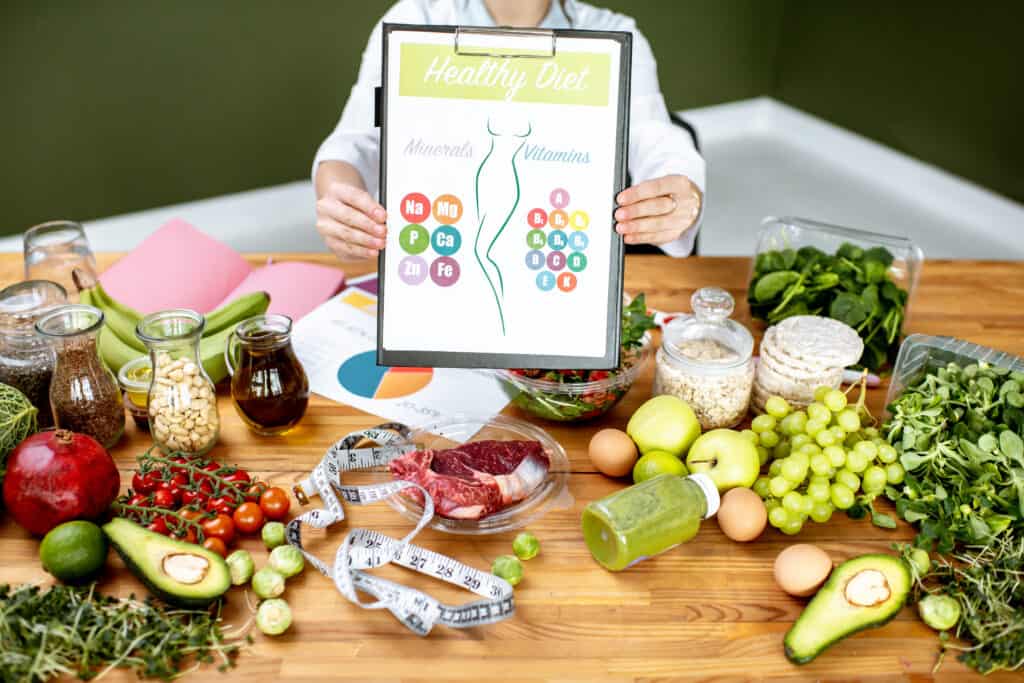The Ultimate Summer Weight Loss Diet Plan See Results Now
Are you looking for an effective weight loss plan to get in shape for the summer? Do you want to lose up to 20 pounds in just a few months? Look no further than this ultimate summer weight loss diet plan.
In this article, we will provide you with a step-by-step guide to achieving your weight loss goals, without compromising on taste and satisfaction.
The Best Weight Loss Diet This Summer
Summer is just around the corner, and with it comes the desire to look and feel our best. Shedding those extra pounds can be a daunting task, but with a well-designed diet plan, it is possible to achieve significant weight loss within a short period of time.
In this article, we will outline a comprehensive weight loss plan that will help you lose up to 20 pounds in the next few months. We will provide you with tips and tricks to make the diet plan more manageable, delicious, and satisfying. So, let’s get started!
Setting Realistic Goals
When setting weight loss goals, it is important to be realistic and specific. Avoid setting goals that are too ambitious or vague, as they can be demotivating and difficult to achieve. Instead, set specific goals that are achievable and realistic.
One way to set realistic goals is to focus on making small changes to your lifestyle that can add up over time. For example, you can start by making healthier food choices, such as choosing whole grains over refined grains, or swapping sugary drinks for water. As you start to see progress, you can gradually increase the intensity and duration of your exercise routine.
Another way to set realistic goals is to break down your overall weight loss goal into smaller, more manageable goals. For example, instead of aiming to lose 20 pounds in a few months, you can aim to lose 2-3 pounds per week. This will help you stay motivated and focused on your progress, rather than feeling overwhelmed by the larger goal.
It is also important to celebrate your successes along the way, no matter how small they may be. Celebrating your progress can help you stay motivated and committed to your weight loss journey. Reward yourself with non-food treats, such as a new workout outfit or a massage, for meeting your goals.

Remember that weight loss is not just about the number on the scale. It is also about improving your overall health and wellbeing. Focusing on the benefits of a healthy lifestyle, such as increased energy, improved mood, and better sleep, can help you stay motivated and committed to your goals.
Understanding Caloric Intake
Understanding your caloric intake is essential for weight loss. To create a calorie deficit, you need to know how many calories your body burns in a day. This is known as your basal metabolic rate (BMR), which is the amount of energy your body requires to function at rest.
Your BMR is influenced by several factors, including your age, gender, weight, height, and activity level. To determine your daily caloric needs, you can use an online calculator or consult with a nutritionist. These tools can help you estimate how many calories your body needs to maintain its current weight.
Once you have determined your daily caloric needs, you can start creating a diet plan that fits your needs. To lose weight, you need to create a calorie deficit by consuming fewer calories than your body burns in a day. Aim to create a deficit of 500-1000 calories per day, which can result in a weight loss of 1-2 pounds per week.
However, it is important to note that consuming too few calories can be harmful to your health. Women should aim to consume at least 1200 calories per day, while men should aim for at least 1500 calories per day. Consuming fewer calories than this can lead to nutrient deficiencies and other health issues.
In addition to monitoring your caloric intake, it is important to focus on the quality of the foods you are consuming. Aim to consume whole, nutrient-dense foods such as fruits, vegetables, whole grains, lean protein, and healthy fats. These foods provide your body with the necessary nutrients to support weight loss and overall health.
Creating a Balanced Meal Plan
To achieve sustainable weight loss, it is essential to create a balanced meal plan. This means that you need to consume a variety of foods that provide you with all the necessary nutrients. Your diet plan should include:

1. Lean Protein
Including lean protein in your diet plan is essential for weight loss and overall health. Protein is necessary for building and repairing muscles, and it also helps keep you feeling full and satisfied for longer periods.
When it comes to selecting protein sources, it is important to choose lean options that are low in saturated fat and calories. Some excellent sources of lean protein include:
- Chicken breast: A 3-ounce serving of chicken breast provides around 26 grams of protein and only 140 calories.
- Fish: Fish such as salmon, tuna, and tilapia are excellent sources of protein and heart-healthy omega-3 fatty acids. A 3-ounce serving of salmon provides around 22 grams of protein and only 175 calories.
- Tofu: Tofu is a plant-based source of protein that is low in calories and high in nutrients. A 3-ounce serving of tofu provides around 7 grams of protein and only 70 calories.
- Legumes: Legumes such as beans, lentils, and chickpeas are excellent sources of protein and fiber. A 1/2 cup serving of black beans provides around 8 grams of protein and 114 calories.
Including lean protein sources in your meals and snacks can help keep you feeling full and satisfied, which can prevent overeating and snacking on unhealthy foods. Aim to include a serving of lean protein in every meal and snack to support weight loss and overall health.
In addition to the sources mentioned above, other lean protein options include lean cuts of beef, turkey breast, Greek yogurt, and eggs. Remember to choose options that are low in saturated fat and calories to support your weight loss goals.
2. Healthy Fats
Incorporating healthy fats into your diet plan is important for weight loss and overall health. While some people may associate fat with weight gain, not all fats are created equal. Healthy fats such as monounsaturated and polyunsaturated fats provide your body with essential fatty acids that are necessary for optimal health.
Some excellent sources of healthy fats include:
- Avocado: Avocados are rich in monounsaturated fats and fiber, which can help keep you feeling full and satisfied. One medium avocado provides around 22 grams of fat and 250 calories.
- Nuts: Nuts such as almonds, walnuts, and cashews are excellent sources of healthy fats and protein. A 1-ounce serving of almonds provides around 14 grams of fat and 160 calories.
- Seeds: Seeds such as chia seeds, flaxseeds, and pumpkin seeds are rich in healthy fats and fiber. A 1-ounce serving of chia seeds provides around 9 grams of fat and 138 calories.
- Olive oil: Olive oil is a healthy source of monounsaturated fats that can be used for cooking and dressing salads. One tablespoon of olive oil provides around 14 grams of fat and 120 calories.
Including healthy fats in your diet plan can help keep you feeling full and satisfied, which can prevent overeating and snacking on unhealthy foods. Aim to include a serving of healthy fats in every meal and snack to support weight loss and overall health.
In addition to the sources mentioned above, other healthy fat options include fatty fish such as salmon and tuna, nut butter such as almond and peanut butter, and cheese such as feta and goat cheese. Remember to choose options that are high in healthy fats and low in saturated fat and calories to support your weight loss goals.
3. Complex Carbohydrates
Incorporating complex carbohydrates into your diet plan is important for weight loss and overall health. Unlike simple carbohydrates, which are quickly digested and can cause blood sugar spikes and crashes, complex carbohydrates provide your body with a steady source of energy and keep you feeling full and satisfied.
Some excellent sources of complex carbohydrates include:
- Whole grains: Whole grains such as brown rice, quinoa, and whole-wheat pasta are rich in fiber, vitamins, and minerals. A 1/2 cup serving of brown rice provides around 22 grams of carbohydrates and 2 grams of fiber.
- Fruits: Fruits such as apples, bananas, and berries are excellent sources of complex carbohydrates, fiber, and vitamins. One medium apple provides around 25 grams of carbohydrates and 4 grams of fiber.
- Vegetables: Vegetables such as sweet potatoes, broccoli, and spinach are rich in complex carbohydrates, fiber, and vitamins. A 1/2 cup serving of sweet potatoes provides around 13 grams of carbohydrates and 2 grams of fiber.
Including complex carbohydrates in your diet plan can help keep you feeling full and satisfied, which can prevent overeating and snacking on unhealthy foods. Aim to include a serving of complex carbohydrates in every meal and snack to support weight loss and overall health.
In addition to the sources mentioned above, other complex carbohydrate options include legumes such as lentils and chickpeas, and starchy vegetables such as corn and peas. Remember to choose options that are high in fiber and low in added sugars to support your weight loss goals.
4. Water
Water is essential for weight loss and overall health. It is necessary for keeping your body hydrated, flushing out toxins, and aiding in digestion. Drinking enough water can also help you feel full and satisfied, which can prevent overeating and snacking on unhealthy foods.
Aim to drink at least 8-10 glasses of water per day, and more if you are active or live in a hot climate. You can also include other hydrating beverages such as herbal tea, coconut water, and infused water.
In addition to drinking water, you can also increase your water intake by eating foods that are high in water content, such as fruits and vegetables. Some excellent options include watermelon, cucumbers, strawberries, and spinach.
Drinking enough water can also help boost your metabolism and aid in weight loss. In one study, people who drank water before meals consumed fewer calories and lost more weight than those who did not.
Meal Plan Example
Here is an example of a meal plan that you can follow to achieve your weight loss goals:
Breakfast
- 1 cup of oatmeal with 1 sliced banana and 1 tablespoon of almond butter
- 1 cup of green tea
Snack
- 1 apple
- 1 small handful of almonds
Lunch
- 4 oz of grilled chicken breast
- 1 cup of mixed vegetables (broccoli, cauliflower, carrots)
- 1/2 cup of brown rice
Snack
- 1 cup of Greek yogurt with 1/4 cup of berries
Dinner
- 4 oz of grilled salmon
- 1 cup of roasted sweet potatoes
- 1 cup of steamed broccoli
Snack
- 1 small handful of baby carrots with hummus
Tips for Success
Here are some tips to help you succeed on your weight loss journey:

1. Be Consistent
One of the most important factors for successful weight loss is consistency. Creating a meal plan and exercise routine that you can stick to is essential for seeing results.
When it comes to meal planning, aim to plan your meals and snacks ahead of time and make sure you have healthy options available. This can help prevent the temptation of unhealthy foods and prevent impulsive snacking. Stick to your meal plan as much as possible, but also allow for some flexibility and variety to prevent boredom and burnout.
Consistency with exercise is also crucial for weight loss. Aim to incorporate regular physical activity into your daily routine, whether it is through cardio, strength training, or a combination of both. Find activities that you enjoy and that fit into your lifestyle, such as taking a walk during your lunch break or joining a fitness class.
It is important to remember that weight loss is a gradual process and results may not be immediate. Be patient and consistent with your efforts, and focus on making sustainable lifestyle changes rather than quick fixes.
If you do experience setbacks or slip-ups, don’t get discouraged. Instead, use them as learning experiences and an opportunity to recommit to your goals. Consistency is key, and with time and effort, you can achieve your weight loss goals and maintain a healthy lifestyle.
2. Plan Ahead
Planning ahead is an important aspect of successful weight loss. When you plan your meals and snacks ahead of time, you are more likely to make healthy food choices and avoid impulsive eating or snacking on unhealthy foods.
To start planning your meals, consider setting aside some time each week to create a meal plan for the upcoming days. This can involve researching healthy recipes, choosing meals and snacks that fit into your dietary preferences and goals, and creating a grocery list for the necessary ingredients.
Meal prepping is another effective strategy for planning ahead. This involves preparing your meals in advance, such as on weekends, and storing them in containers in the fridge or freezer for easy access throughout the week. Meal prepping can save time and ensure that you always have healthy options on hand, even on busy days.
In addition to meal planning and prepping, consider packing healthy snacks and meals to take with you when you are on the go. This can help prevent impulsive snacking or eating out at unhealthy fast food restaurants. Some examples of portable snacks and meals include cut-up veggies with hummus, hard-boiled eggs, and fruit with nuts.
By planning ahead, you can set yourself up for success and make healthy choices that support your weight loss goals. Take the time to plan your meals and snacks, and consider meal prepping and packing healthy options for when you are on the go.
3. Keep Track of Your Progress
Keeping track of your progress is an important aspect of successful weight loss. By monitoring your weight and taking measurements, you can track your progress and adjust your diet and exercise plan accordingly.
Aim to weigh yourself regularly, such as once a week, to monitor your progress. It is important to note that weight can fluctuate throughout the day and from week to week, so it is important to focus on the overall trend rather than individual fluctuations.
In addition to weighing yourself, consider taking measurements such as waist circumference, hip circumference, and body fat percentage. These measurements can provide a more accurate picture of your progress and help you identify areas where you may need to make adjustments.
Keeping track of your progress can also help keep you motivated and on track with your weight loss goals. Seeing progress can be a powerful motivator and can help you stay committed to your diet and exercise plan.
Remember to be patient and realistic with your expectations, as weight loss is a gradual process. Celebrate your successes along the way and use any setbacks as opportunities to learn and make adjustments to your plan.
4. Get Moving
Exercise is an important component of a successful weight loss plan. In addition to helping you burn calories and lose weight, exercise provides a wide range of physical and mental health benefits.
Aim to get at least 30 minutes of moderate-intensity exercise per day, such as brisk walking, cycling, or swimming. You can also break up your exercise into shorter sessions throughout the day, such as 10-minute walks after meals.
Strength training is also an important aspect of weight loss, as it helps build muscle and increase metabolism. Aim to incorporate strength training exercises such as squats, lunges, and push-ups into your exercise routine at least twice a week.
Remember to choose activities that you enjoy and that fit into your lifestyle, as this will make it easier to stick to your exercise routine. You can also mix up your exercise routine by trying new activities such as dance classes, yoga, or hiking.
In addition to helping you lose weight, regular exercise can provide a wide range of physical and mental health benefits, including reducing the risk of chronic diseases such as heart disease, improving mood and mental health, and increasing energy levels.
5. Get Enough Sleep
Getting enough sleep is essential for weight loss and overall health. Adequate sleep is necessary for the proper functioning of your metabolism, hormones, and immune system.
Aim to get at least 7-8 hours of sleep per night to support your weight loss goals. Lack of sleep can disrupt the hormones that regulate appetite and metabolism, leading to increased hunger and cravings for unhealthy foods. In addition, poor sleep can lead to increased stress, which can also contribute to weight gain.
To improve your sleep quality, aim to establish a regular sleep schedule and create a relaxing bedtime routine. Avoid caffeine, alcohol, and electronic devices before bed, as these can interfere with sleep quality. Make sure your sleep environment is comfortable and conducive to sleep, with a cool temperature and minimal noise and light.
In addition to improving weight loss, getting enough sleep can provide a wide range of health benefits, including reducing the risk of chronic diseases such as diabetes and heart disease, improving mood and mental health, and increasing energy levels.
In conclusion, getting enough sleep is essential for weight loss and overall health. Aim to get at least 7-8 hours of sleep per night, establish a regular sleep schedule, create a relaxing bedtime routine, and make sure your sleep environment is comfortable and conducive to sleep. By prioritizing sleep, you can support your weight loss goals and improve your overall health and well-being.
FAQs
- Is it possible to lose 20 pounds in a few months? Yes, it is possible to lose 20 pounds in a few months with a healthy diet plan and exercise routine.
- Can I eat carbs and still lose weight? Yes, you can eat carbs and still lose weight. Just make sure to include complex carbohydrates in your diet plan.
- Is it necessary to count calories to lose weight? While it is not necessary to count calories, it is essential to create a calorie deficit to lose weight.
- Can I indulge in treats while following a weight loss diet plan? Yes, you can indulge in treats occasionally while following a weight loss diet plan. Just make sure to keep portion sizes in check.
- Will I gain back the weight once I stop following the diet plan? If you return to unhealthy eating habits once you stop following the diet plan, you may regain the weight. However, if you make sustainable changes to your lifestyle, you can maintain your weight loss in the long run.
Start Your Summer Weight Loss Journey Today
Losing weight can be challenging, but with a well-designed diet plan, it is possible to achieve significant weight loss within a short period of time. In this article, we have provided you with a comprehensive summer weight loss diet plan that will help you shed up to 20 pounds in a few months.
Remember to set realistic goals, create a balanced meal plan, and incorporate exercise into your daily routine. With consistency and determination, you can achieve your weight loss goals and feel your best this summer.
What To Do Next…
For people who want to stop struggling with their weight

We Now Have FDA Approved Semaglutide Weight Loss in Sarasota and Bradenton Florida. Book a free consultation and find out about the semaglutide cost and semaglutide side effects. Semaglutide injection are available after your free consultation.






